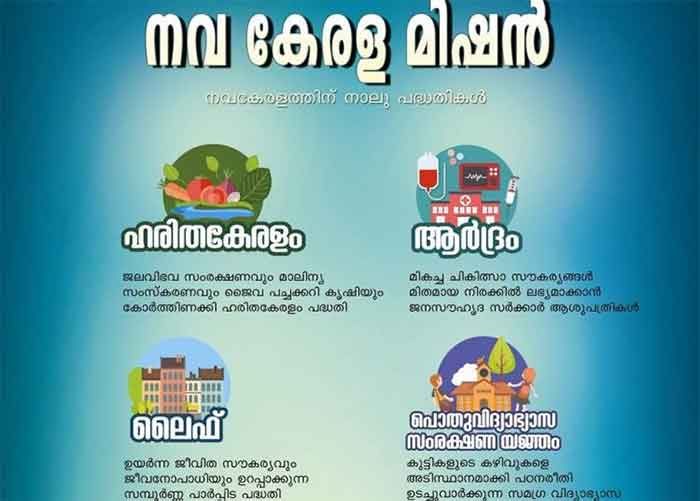
On May 19th, the Indian Express carried an Op-Ed by Dr. Thomas Isaac, who was Kerala’s Finance Minister in the previous Cabinet, where he presents what may be understood as the core of the Nava Keralam or New Kerala Model: “Kerala is on a course to create an economy that ensures high growth and equity.” On the ground, it is visible as an infrastructure-led approach: rapid, widespread and extensive construction. Knowing what we know in the 21st century, can we dare to imagine a Nava Keralam of “high growth and equity” at the cost of that on which this is built; without planning our habitations, services and life around the habitats of other life forms? That is not an option and it is non-negotiable. The pandemic and cyclone Tauktae have shown us this and are portents of a future which needs us to re-think what Nava Keralam should be. We need to build socio-ecologically resilient communities: on a land increasingly vulnerable to the impacts of a rapidly heating Arabian Sea leading to more frequent cyclones, where in the pursuit of “high growth” webs of life around us are being fragmented and severed and democratic processes of consultation and self-reliance increasingly compromised.
To define this Nava Keralam model further, it is being suggested that this will be a “Knowledge Economy”. Let us try to understand what are some imperatives for a “knowledge economy” particularly in the context of the rapid overtaking of our open green “commons” in an increasingly built-up, urbanising Kerala.
All our health and well-being (mental and physical) and more so of children and youth, is central to realising this vision. It is well-established that exposure to biodiverse, green spaces is associated with better physical and mental health and cognitive development of children: critical element in sustaining a knowledge economy. What are green spaces? These are open, vegetated areas woven into habitations in the form of trees, shrubs, avenue plants, food gardens both in private spaces and public spaces and parks. They are not merely vegetation, rather they enable practice of livelihoods, afford shelter to all life forms and create micro climates that temper and moderate increasing temperatures. But green spaces also include spontaneously vegetated uncultivated ‘wild’ patches in urban areas in Kerala created by the moisture and temperature. Green spaces do not always have to be ‘created’ by planting trees or setting up landscaped gardens around constructions. They can be old vegetated areas that need to be retained and rejuvenated by building around them or including them.
With the work and study-from-home being the new normal now for more than a year, we learn more and more about the impact this is having on mental health of both children and adults as well as how it is impacting children’s learning. Even when we emerge on the other side of the pandemic, the knowledge sector requires people to be working long hours indoors in front of screens. Rising air pollution in densely populated, congested urban environments with their high density of vehicles impacts our respiratory health and immune systems, particularly children and older people. This leaves us more vulnerable to pandemics, predicted to increase in the future, if we continue to clear and destroy forests which serve as the natural “firewalls” between humans, domestic animals and wildlife reservoirs of microbes. All this does not present a conducive environment for a physically, emotionally, mentally and intellectually vibrant and healthy workforce: essential for a knowledge economy.
What this means is, to re-imagine urban planning in building and sustaining the knowledge economy for the Nava Keralam. Cities and towns in Kerala have to be imagined as liveable, breathable places rather than ‘smart cities’ of concrete, steel and glass monoliths. In a time when alternative models for cities are being actively considered based on principles of circular economies and solidarity economies what prevents Kerala from developing one drawn from its own socio-ecological context, built with and around green spaces? As stewards of a culture embedded in rich, complex, biodiversity and built on principles of decentralised governance and self-reliance, there is a responsibility to do this. In practice this would mean a planning process that is truly transparent, inclusive and democratic in spirit and act through extensive public consultations across all sections of society. This will require public hearings in schools and colleges to hear the voices of the next generation, whose future is being planned, and other public spaces to include the voices of those whose lives are deeply impacted but never consulted in conventional planning processes. When planning is truly inclusive and democratic there is an ownership that is infused among people which can sustain the existence of the city. Implementing such plans require re-imagining governance.
There is no dearth of ideas, plans, technical know-how in Kerala. Over the last few years, many individual and collective voices have repeatedly urged for a re-thinking and re-imagining of the trajectory of Kerala’s development spelling out in great clarity what needs to be done.
A knowledge economy of the future must be built as a digital commons making access to knowledge democratic. Kerala’s leadership in the open source movement is testament to this. Can we have a digital commons without regenerating the ecological and social ‘commons’ around us?
As a new Government, with the next generation policy makers, takes charge, will Kerala re-imagine governance towards building a Nava Keralam that sustains its ecological and social inheritance where people across identities can be heard, dialogue, and participate in decision-making leading to a culture of commons so crucial to realising a vision of a democratic, just, knowledge economy? A question for all of us.
Radha Gopalan is an environmental scientist by training who believes that the hope for the future is in collectively building socio-ecological resilience
GET COUNTERCURRENTS DAILY NEWSLETTER STRAIGHT TO YOUR INBOX
Related posts:
Views: 0
 RSS Feed
RSS Feed

















 May 23rd, 2021
May 23rd, 2021  Awake Goy
Awake Goy  Posted in
Posted in  Tags:
Tags: 
















